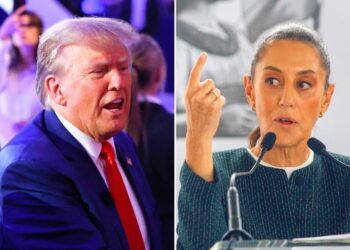“The corrupt judges – are they going to continue defending foreign companies that come to loot, rob and affect the economy of Mexicans?” asks Andrés Manuel López Obrador (AMLO). The outgoing Mexican president’s typically warm welcome to international investors comes as his governing Morena party consolidates power.
Morena is seeking a constitutional amendment that would replace thousands of top judges with new, elected ones. Critics say it would leave the legal system open to abuse, with judges potentially ruling on cases involving the same drug lords and politicians that contributed to their election campaigns, says Mary Beth Sheridan in The Washington Post.
The impact of Mexico’s new controversial reform
The courts have long frustrated AMLO. Now Morena is eager to remove one of the last checks on its power, fuelling fears that Mexico will return to the “one-party state” model it had for most of the 20th century. Business is less willing to invest in states with capricious legal systems. There are already signs of waning confidence, with the peso dropping more than 10% against the dollar since Morena’s victory in elections in June. The local IPC stock index has shed 11% in 2024. “Mexico’s justice system is slow and often corrupt,” says The Economist.
Subscribe to MoneyWeek
Subscribe to MoneyWeek today and get your first six magazine issues absolutely FREE
Get 6 issues free
Sign up to Money Morning
Don’t miss the latest investment and personal finances news, market analysis, plus money-saving tips with our free twice-daily newsletter
Don’t miss the latest investment and personal finances news, market analysis, plus money-saving tips with our free twice-daily newsletter
But AMLO’s plans for all federal judges, including those on the Supreme Court, to be elected will only make things worse. Bolivia – the only other country in the world to have gone down that path – has had a “disastrous” experience with judicial elections, which have turned the courts from “a neutral arbiter” into a political “prize”.
At a time when Mexico should be cashing in on “nearshoring” of manufacturing supply chains, AMLO is instead jeopardising his country’s free-trade deal with the US and Canada, which comes up for review in 2026. Uncertainty about the reforms is already hurting investment. Company representatives “estimate that foreign firms are holding back some $35 billion in investment projects”, a figure approaching the amount that Mexico “attracts in foreign direct investment in an average year”, say Santiago Pérez and José de Córdoba in The Wall Street Journal.
IT, car manufacturing and natural gas pipeline projects are all reportedly stalled. Those with a very high-risk appetite spy an opportunity, says Craig Mellow in Barron’s. The bad news could be priced in following big falls in the peso and local stocks. Optimists are pinning their hopes on AMLO’s “cerebral” protégé Claudia Sheinbaum, who takes over the presidency next month. While a Morena loyalist, she is also pragmatic and doesn’t have her mentor’s “pugnacious” tendencies.
The reforms “will be watered down to something” the US can live with, predicts Malcolm Dorson of Global X ETFs. Then again, perhaps not.
This article was first published in MoneyWeek’s magazine. Enjoy exclusive early access to news, opinion and analysis from our team of financial experts with a MoneyWeek subscription.
Source link : http://www.bing.com/news/apiclick.aspx?ref=FexRss&aid=&tid=66e7f770ebde40fea87ecf0035e28e3f&url=https%3A%2F%2Fmoneyweek.com%2Feconomy%2Fglobal-economy%2Fmexico-passes-controversial-reform&c=579249872418684557&mkt=en-us
Author :
Publish date : 2024-09-15 22:00:00
Copyright for syndicated content belongs to the linked Source.







